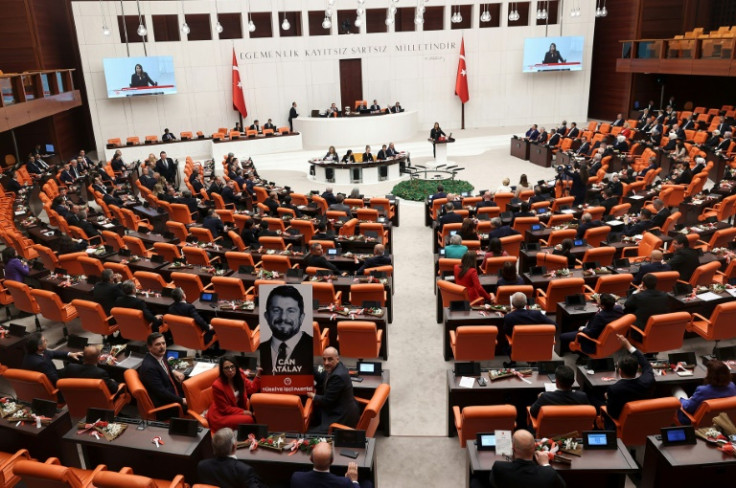Turkey's Two Top Courts Go To War Over Jailed Politician

Turkey teetered on the edge of political crisis Wednesday as one top court filed a criminal complaint against members of another over its order to release a jailed opposition politician.
The Supreme Court of Appeals said it was filing criminal charges against members of the Constitutional Court who ruled that Can Atalay be released.
The 47-year-old lawyer was one of seven defendants sentenced last year to 18 years in prison as part of a highly controversial trial that also saw the award-winning philanthropist Osman Kavala jailed for life.
Kavala was found guilty of trying to overthrow the constitutional order by allegedly funding 2013 protests against the government of then prime minister Recep Tayyip Erdogan.
Atalay represented the legal defence team of the people involved in those protests.
Both men called the charges against them political and fictitious.
Turkey's election commission then allowed Atalay to run from jail as a candidate for the leftist Workers' Party of Turkey (TIP) in May's general elections.
He was elected as a representative of the southern Hatay province and then petitioned the Supreme Court to release him because he now enjoyed immunity from prosecution.
The Supreme Court denied Atalay's appeal in July.
The Constitutional Court ruled last month that the Supreme Court violated Atalay's rights.
The Supreme Court fired back on Wednesday by filing criminal charges against Constitutional Court members who sided with Atalay.
It issued a statement accusing the Constitutional Court of "exceeding its legal authority" and filed a criminal complaint with the chief public prosecutor's office.
The entire criminal case stemmed from a wave of 2013 protests that posed the first serious challenge to Erdogan's increasingly dominant rule.
The youth-driven protests were initially focused on government plans to tear down Gezi Park -- a small green space near Istanbul's iconic Taksim Square.
They soon morphed into a nationwide protest movement against perceived corruption by the ruling Islamic-rooted party and Erdogan's growing authoritarianism.
Erdogan's government violently dispersed the protests and then began to crack down on its leaders.
These included supporters of the LGBT movement and leading secular intellectuals such as Kavala.
The Council of Europe this year awarded Kavala its top human rights prize to highlight Turkey's refusal to abide by repeated European court rulings ordering the philanthropist's release.
Ankara blasted the award as meddling in Turkey's internal affairs.
Atalay's fight for freedom and the right to join parliament has also gained added political significance.
Turkey's secular opposition CHP party convened an emergency meeting late Wednesday to address the emerging judicial crisis.
Newly-elected CHP leader Ozgur Ozel accused the Supreme Court of trying "to rebel against the constitutional order".
Turkish President Recep Tayyip Erdogan's office issued no immediate comment.
But even some of the powerful president's allies spoke out against the Supreme Court's decision to target senior judges.
"We are experiencing events that should never, ever happen," leading ruling AKP party lawmaker Hayati Yazici said on social media.
"The agencies that make up the state should resolve problems. They should never create them. They cannot trip each other up."
© Copyright AFP 2024. All rights reserved.











